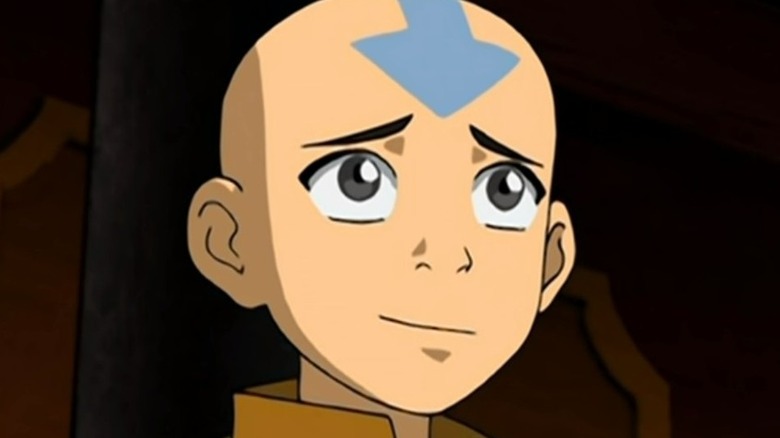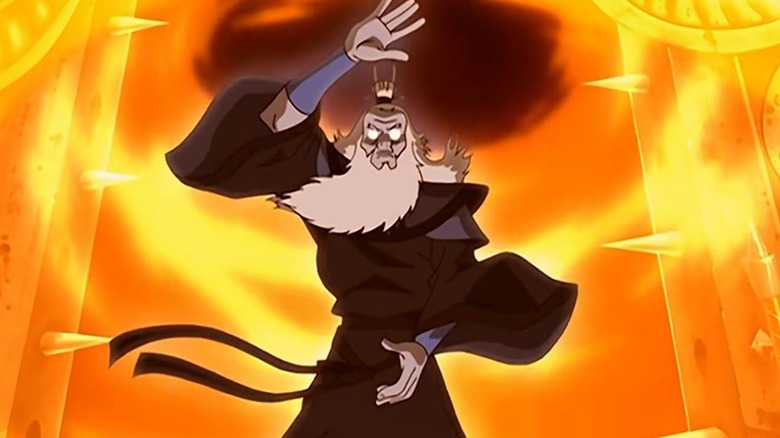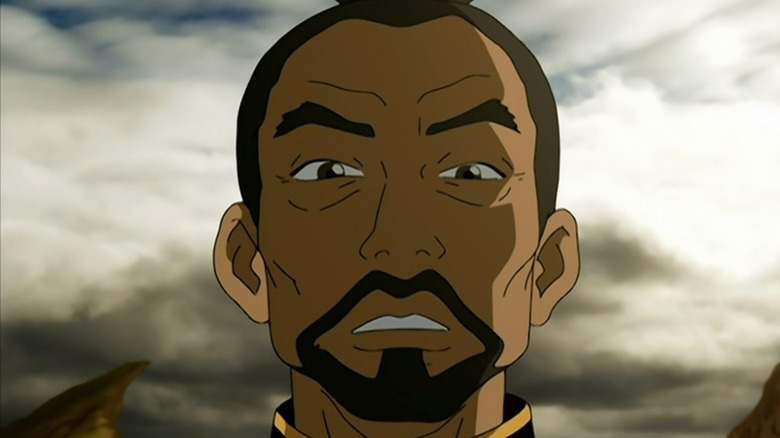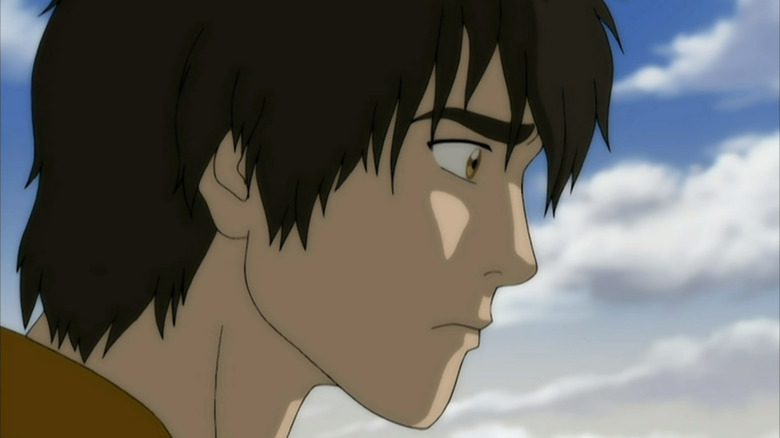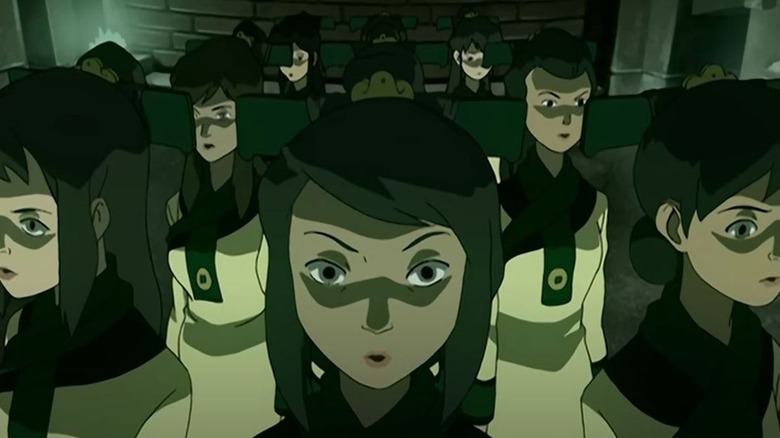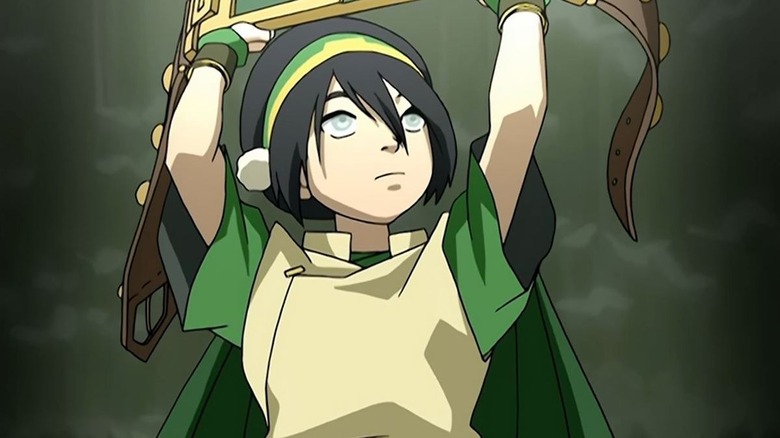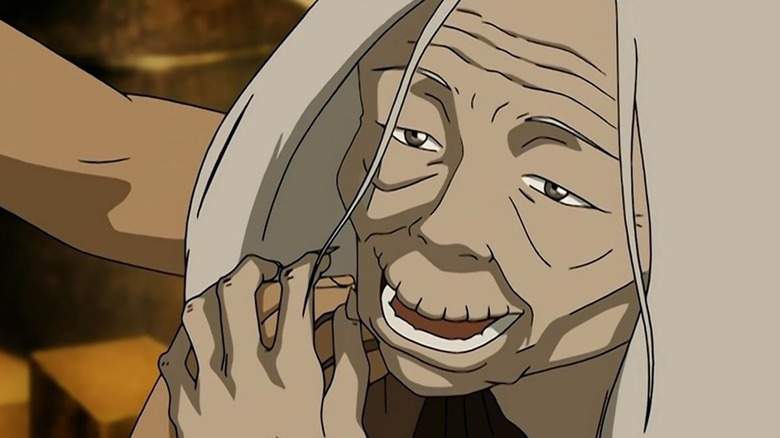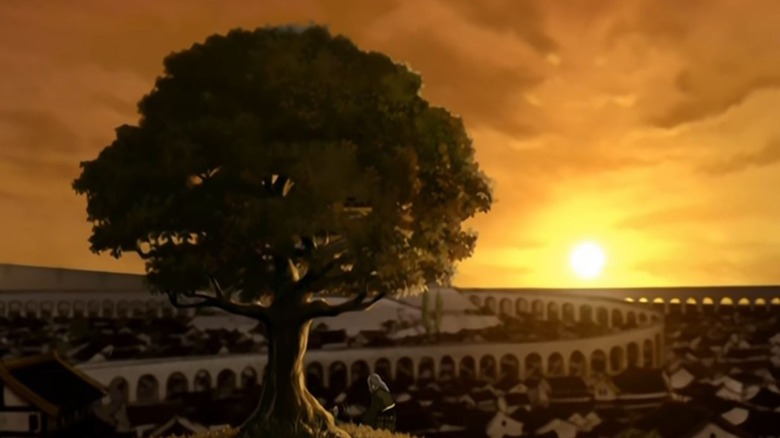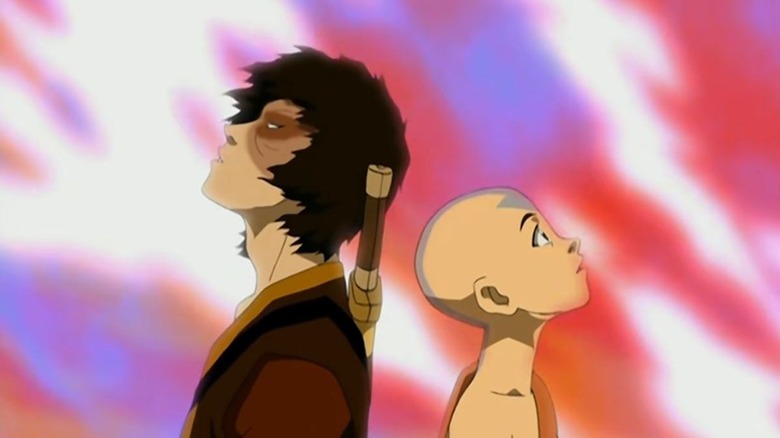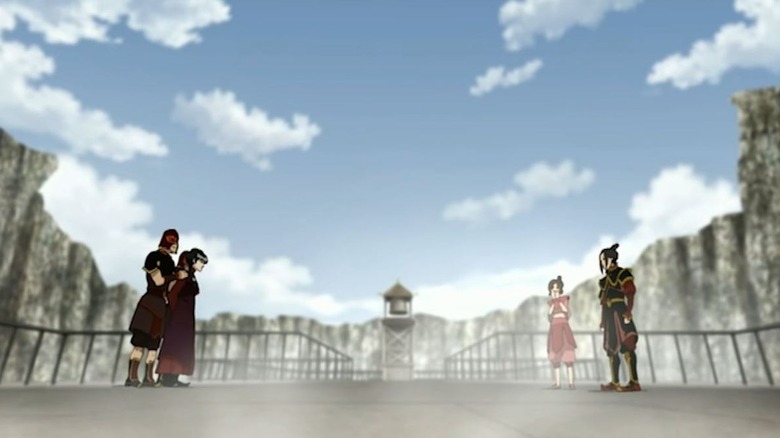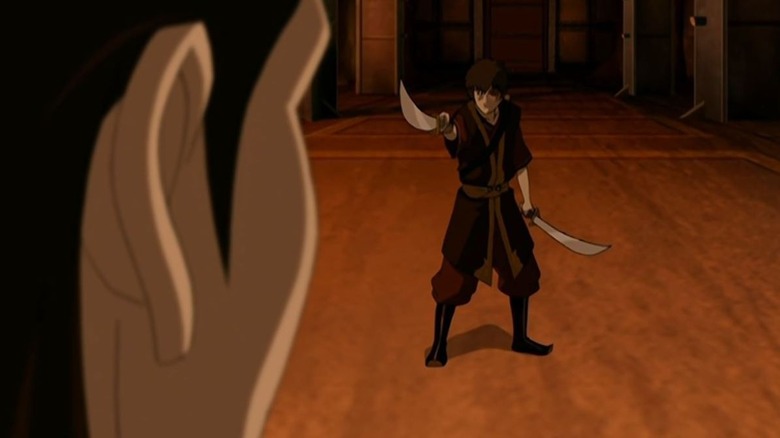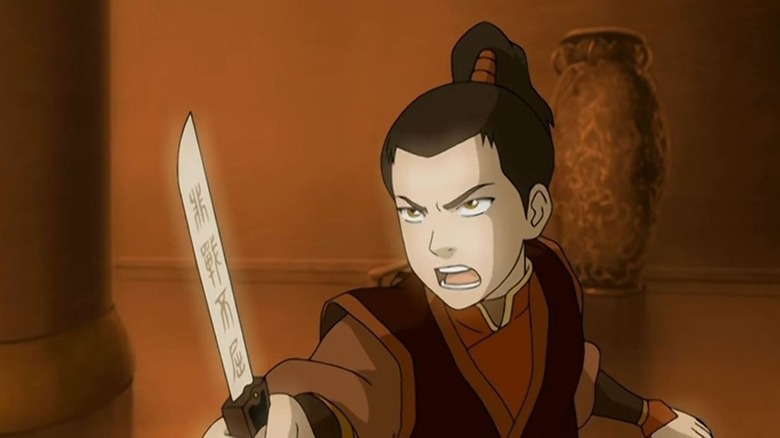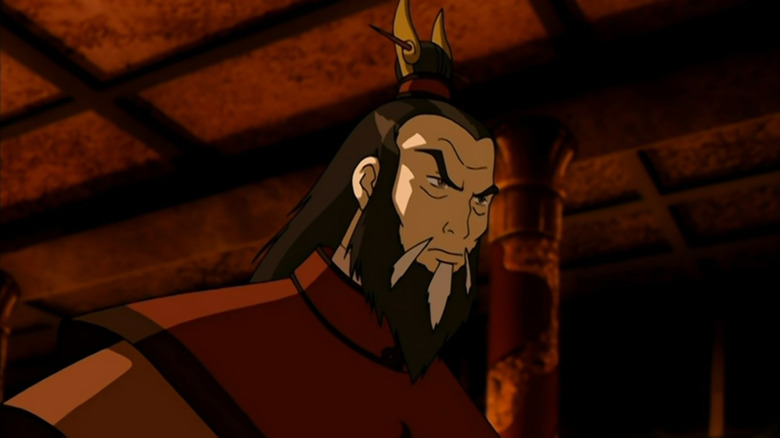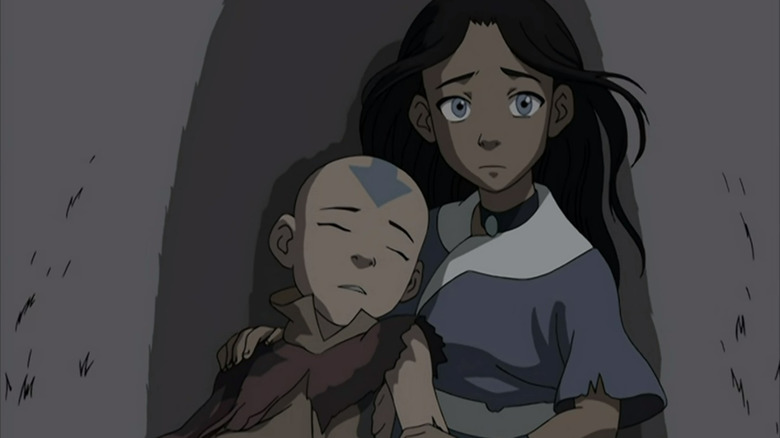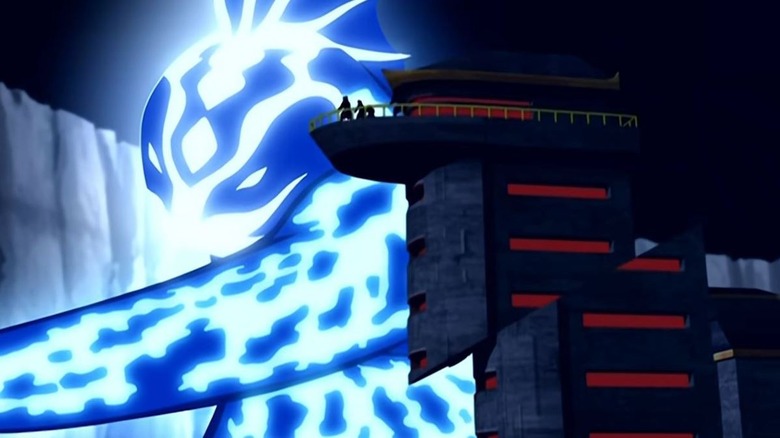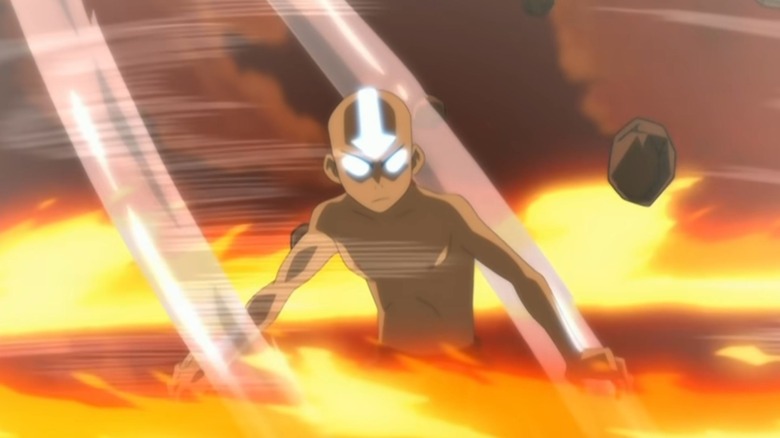The 15 Best Episodes Of Avatar: The Last Airbender, Ranked
The animated series "Avatar: The Last Airbender" follows the story of twelve-year-old Aang. In a world where "bending" the elements is possible but each bender can only control one element, Aang is the Avatar — the only one who can control air, fire, water, and earth all at once. As the last surviving member of his nation, the Air Nomads, Aang is also the only remaining airbender on the planet. Unfortunately, he spends a hundred years frozen in ice, and when he finally wakes up, he has a big mission — mastering all four elements in order to stop the war that's been ravaging the world since he vanished.
Since its premiere in 2005, the show has grown into a massive franchise, spanning the sequel series "The Legend of Korra," numerous comic books, games, and a movie that most fans prefer not to talk about. "Avatar" itself has a total of 61 episodes across its three seasons, or "books." Each book focuses on Aang's mastery of a different element, starting with water, then earth, and finally fire. The whole show is filled with great stories, but if you're planning your next re-watch, there are some that absolutely aren't to be missed. These are the 15 best episodes of "Avatar: The Last Airbender," ranked.
15. The Winter Solstice (Season 1, Episodes 7-8)
A lot of fans would tell you that Season 1 is the slowest part of the "Avatar: The Last Airbender" timeline. However, a story so rich in history and worldbuilding takes time to develop, and Season 1 is instrumental in constructing this background. It sets the stage for the journey the show's characters go on and foreshadows the challenges they face as the story unfolds.
"The Winter Solstice" is one of Season 1's masterful two-parters, expanding on the rich lore of the series. In the first part, we get a glimpse into Aang's deep-rooted connection with all the past Avatars before him and the Avatar's role as the bridge between the physical and spiritual realms. These are things that, at this point in the show, Aang is still unfamiliar with. He accidentally stumbles into the Spirit World and learns that he must seek out a temple in the Fire Nation to communicate with the spirit of Roku, the last Avatar before him. Team Avatar ventures into hostile Fire Nation territory to find Roku's spirit, but they're followed by Zuko and Zhao. This sets us things nicely for the fiery climax when Roku finally lets his power be seen
"The Winter Solstice" is a big turning point in the show, and it's packed full of powerful moments and beautiful animation. It's a stand-out episode that expands on its spiritual themes while also imposing a strong sense of urgency on Aang's mission.
14. Sokka's Master (Season 3, Episode 4)
Sokka is often just used for comic relief in "Avatar," but in the Season 3 episode "Sokka's Master," he finally gets his time to shine when training with the Fire Nation swordmaster Piandao.
Sokka's strong qualities of intelligence, resourcefulness, and creativity are reaffirmed by Piandao through his training, with the master going as far as to say that Sokka is his most worthy student ever. Sokka eventually confesses to being from the Southern Water Tribe, which leads to a tense showdown between the two. In the end, Piandao admits he recognized Sokka as Water Tribe the moment he first saw him and that he was simply testing him. As a master swordsman, spreading the knowledge of his art transcends political divisions. At the end of the episode, viewers are shown that Piandao is a member of the White Lotus –- a borderless secret society whose interests are for the greater good of humanity as a whole, rather than any one nation.
"Sokka's Master" features some meaningful character growth for Sokka, introduces us to a new ally in Piandao, and gives us a hint about the important role the White Lotus will play as the show's story continues to unfold. It's a great instance of episodic writing that subtly builds out the "Avatar" world in powerful ways.
13. The Western Air Temple (Season 3, Episode 12)
"The Western Air Temple" is one of the major turning points in "Avatar: The Last Airbender." After struggling to realize and come to terms with his own destiny, Zuko finally decides to leave his family behind and join Team Avatar, finally giving himself the chance to be the hero that fans always wanted him to be.
This episode explores the awkward dynamics of Zuko trying to convince the group to let him join them, despite their history. It's particularly interesting to see the unique ways in which each character responds to his change of heart. Katara is suspicious of his motivations, and Sokka is just as wary as Katara. Aang, burdened by the failure of their attack during the solar eclipse, feels lost and unable to commit one way or another and looks to the rest of the group to make the decision. Toph ends up being the voice of reason. She understands the difficulty of escaping a dysfunctional family and is able to look past Zuko's transgressions.
"The Western Air Temple" does a great job of taking a step back from the quick pace of Season 3. It gives us a closer look at each character's motivations and dynamics, and it finally makes good on the promise of bringing Zuko into the fold. The episode also has a striking setting, as the Western Air Temple literally hangs off the bottom of a cliff. This design contributes to the tense climax when Combustion Man shows up for the last time.
12. Lake Laogai (Season 2, Episode 17)
"Lake Laogai" is an important episode for several subplots in "Avatar: The Last Airbender" Season 2. It finally reveals the inner workings of the Dai Li and their conspiracy to maintain control of Ba Sing Se. We also get to see the conclusion of the Jet and Appa storylines and the beginning of Zuko starting to truly question his destiny.
As we follow Team Avatar into Lake Laogai, the abstract idea of Ba Sing Se being brainwashed turns into a chilling reality. The episode does a great job of showing the secret police force's horrifying practices, both through the rows of brainwashed Joo Dees and Jet's own tragic struggle. "Lake Laogai" is one of the show's darkest episodes, and its parallels with real-world authoritarianism make it all the more chilling.
The highlights here are Appa's return and Zuko's arc. Stuck at a personal crossroads, the exiled prince is implored by Iroh to consider what he really wants and if capturing the Avatar is truly his destiny. He makes a difficult choice to set Appa free, marking the beginning of his struggle to find his place in the world. This episode, which is equal parts amazing and terrifying, also won animation director Sangjin Kim a Primetime Emmy Award.
11. The Blind Bandit (Season 2, Episode 6)
"The Blind Bandit" introduces one of the most beloved characters in the history of "Avatar," and it does so in spectacular fashion. In 2007, the episode was ranked 12th in a fan poll conducted by nickelodeon to find rank the "100 Greatest Nicktoons Episodes," proving just how much viewers love it. The episodes leading up to this one show Aang searching for the right earthbending teacher, and fortunately, he finally finds her.
In "The Blind Bandit," Team Avatar attends Earth Rumble VI: An earthbending competition in a giant underground arena. Unimpressed by the more muscly fighters who Sokka fawns over, Aang is immediately interested when Toph enters the ring under the pseudonym "The Blind Bandit." Her clear mastery of neutral jing — a core tenet of earthbending according to King Bumi — makes him confident that she's meant to be his earthbending teacher. And of course, it helps that he previously had a vision in the swamp of a girl who looks just like her.
Convincing Toph to join Team Avatar isn't easy, however. We're given a closer look into her overbearing parents, her strict upbringing, and how she mastered earthbending. After defeating all the Earth Rumble fighters at once in a fantastic display of her earthbending prowess, Toph decides to leave her family behind to join Team Avatar's cause. The group and the show as a whole are both better for it.
10. The Puppetmaster (Season 3, Episode 8)
"The Puppetmaster" is one of the darker and more disturbing episodes of "Avatar: The Last Airbender," featuring one of the show's most sinister characters and introducing the ominous waterbending technique called bloodbending. While telling ghost stories out in the woods one night, Team Avatar meets an elderly innkeeper named Hama. After hearing a rumor of people disappearing from the nearby town every full moon, they begin to suspect her. Hama soon reveals herself to be a waterbender from the South Pole who escaped from a Fire Nation prison. She offers to teach Katara her techniques, and she happily accepts, only to later learn the horrific nature of Hama's power.
The bone-chilling fight between Katara and Hama is one of the most memorable scenes in the whole show, and one of Katara's most powerful moments. The moment when Hama bloodbends Aang and Sokka, forcing Katara to bloodbend against her conscience to save them and put a stop to her violence, is a haunting one. "The Puppetmaster" hits the nail on the head with its creepy imagery and themes of possession, as well as in the way in which Hama goes from a sweet old lady to a terrifying puppetmaster in a matter of seconds. The combination of bloodbending and the tense ghost-story tone is sure to send shivers down anyone's spine.
9. The Tales of Ba Sing Se (Season 2, Episode 15)
"The Tales of Ba Sing Se" is a unique slice-of-life episode — a series of six vignettes that give us a glimpse into the personal lives of the show's main characters as they go about their days in Ba Sing Se. It gives viewers a respite from one of the show's bleaker periods while Team Avatar is separated from Appa, while also filling in some important bits of character development and backstory.
There are a lot of great moments throughout this episode, ranging from heartwarming to awkward and hilarious. Aang builds a zoo, Toph and Katara get makeovers, Zuko goes on a date, and Sokka accidentally enters a haiku battle. The most famous vignette, however, is probably "The Tale of Iroh," which is dedicated to the character's beloved voice actor, Makoto Iwamatsu (credited as Mako), who passed away shortly before the episode aired. Iroh's tale reveals the grief that he carries with him from the loss of his son, Lu Ten, culminating in a heartbreaking rendition of "Leaves from the Vine" — a song we hear Iroh sing joyfully just moments earlier.
"The Tales of Ba Sing Se" is a favorite episode among fans and critics alike, and it's easy to see why. It's packed with humor, worldbuilding, and heart, featuring all the things that make the show so special.
8. The Firebending Masters (Season 3, Episode 13)
"The Firebending Masters" is considered by many fans to be one of the best episodes in all of "Avatar," so it's a perfect fit for our top 10. It shows immense character growth for both Zuko and Aang, while also showing that the original form of firebending is far more positive than that practiced under Fire Lord Ozai.
In the episode, Aang and Zuko go on a journey to find the (presumably) extinct Sun Warriors' ancient city, hoping to find some clues there about the original source of firebending after Zuko's powers decline. They discover that the Sun Warrior civilization is still very much alive and thriving and are given a test. Each of them must carry a piece of the eternal flame to the Firebending Masters Ran and Shaw, who turn out to be the last living dragons. Neither manages to keep their flame alive, but by performing the "Dancing Dragon," an ancient firebending form, they are able to appease the masters and discover the true meaning and beauty of firebending.
In addition to its brilliantly written philosophical themes and breathtaking animation, "The Firebending Masters" reveals that Iroh misled the Fire Nation into believing he slew the last remaining dragons in order to protect their legacy. Gorgeous and powerful, it's also the episode that properly establishes Aang and Zuko as true friends.
7. The Boiling Rock (Season 3, Episodes 14-15)
"The Boiling Rock" is an exciting two-part episode filled with twists, turns, enemies becoming friends, and friends betraying each other. We get a fantastic show of acrobatics and martial arts in this episode, including one of Suki's all-time greatest moments. The story follows Sokka and Zuko as they journey to the Boiling Rock, a Fire Nation prison in the center of a boiling lake, to try to free Sokka's father, Hakoda. They eventually reconnect with both him and Suki, and they attempt to make their escape on a gondola by holding the warden hostage. Unfortunately, Azula and Ty Lee show up to cause trouble, with a spectacular battle ensuing atop the moving gondola. In the end, they escape thanks to an intervention from Mai, who betrays Azula by incapacitating the entire squad of prison guards.
The confrontation that follows between Azula and Mai is one of the most intense in the entire show. Ty Lee chi-blocks Azula to stop her from lashing out and killing Mai, leaving her temporarily paralyzed and powerless. This sets off Azula's downward spiral in the episodes that follow, culminating in her defeat at the hands of Zuko and Katara. Beyond that, the two-parter features some exceptional action, great character development, and a fantastic guest performance from Wade Williams as the Warden.
6. The Day of Black Sun (Season 3, Episodes 10-11)
"The Day of Black Sun" is a monumental two-part episode that marks Team Avatar's first attempt at defeating the Fire Lord during the titular solar eclipse, thus beginning the entire series' epic conclusion. The episode is packed with dramatic decisions, manipulations, and a pretty dour ending, firmly earning its place as one of the show's best.
The first half of "The Day of Black Sun," "The Invasion," creates some excellent build-up to the eclipse, featuring several returning allies and a well-executed first phase of the invasion plan. Aang and Katara finally share a long-awaited kiss shortly before Aang leaves to confront the Fire Lord, filled with fear that he may never see her again. The battle near the royal palace is one of the most ambitious and exciting fights in the whole series, and it's great to see so many past characters joining forces in such grand fashion. Of course, because of Azula's prior knowledge of the invasion, Team Avatar's plan starts to falter in part two, "The Eclipse."
The real climax of the episode is Zuko's confrontation with Ozai. After two and a half seasons, he finally breaks free of his father's shackles. The conviction with which he defies Ozai, the reverence with which he speaks of Uncle Iroh, and the restraint he shows in sparing his father's life Ozai's when redirecting his lightning all make this one of the greatest showdowns in the series.
5. Zuko Alone (Season 2, Episode 7)
"Zuko Alone" is a brilliantly written character episode dedicated entirely to, you guessed it, Zuko. With a classic Western setting, it's especially unique, as it doesn't follow Aang or the rest of Team Avatar at all. Instead, it focuses solely on Zuko's journey through the Earth Kingdom and his past.
At this point in the show, Zuko is still willfully ignorant of the destruction the Fire Nation has wrought upon the world, instead being consumed by his obsession with regaining his honor. Traveling alone through the Earth Kingdom, he has his eyes opened for the first time to the horrific damage his nation has caused to the lives of so many innocent people. We see Zuko develop a sense of responsibility and guilt when he helps a family of humble farmers stand up to corrupt Earth Kingdom soldiers. He sees himself in the farmer's son and tries to teach him to defend himself, even offering the young boy a dagger that Iroh had gifted him as a child.
Zuko ultimately reveals himself as the banished Prince of the Fire Nation, and despite his good deeds, he's understandably rejected by the town. On the whole, the episode is brilliant, nuanced, and poignant, exploring both the horrors of war and Zuko's own struggles. The obvious samurai and Wild West inspirations are just the icing on the cake. "The Legend of Korra" paid homage to "Zuko Alone" years later with a similarly styled episode called "Korra Alone."
4. The Avatar and the Fire Lord (Season 3, Episode 6)
"The Avatar and the Fire Lord" is a great example of the wonderful narrative parallelism in "Avatar: The Last Airbender." Over the course of the episode, Aang and Zuko separately learn about the relationship between Zuko's great-grandfather, Firelord Sozin, and Aang's predecessor, Avatar Roku.
Through a series of flashbacks, we're given a detailed look at the close relationship shared between Roku and Sozin — one that has a tragic and heartbreaking ending. At the end of the episode, it's revealed that one of Zuko's maternal great-grandfathers was in fact Avatar Roku, forcing him to reconcile the internal struggle he's dealt with throughout the show. The flashbacks also shed a lot of light on how the world got to the point where the Fire Nation was able to begin such a massive and violent war.
"The Avatar and the Fire Lord" is an epic saga that condenses two lifetimes' worth of history into a single episode. It discusses themes of generational trauma, the thirst for power in Zuko's father's bloodline, and the complications that come with war and death. It also shows us and the characters of the show just how inseparably intertwined Zuko and Aang's destinies are. The impact of this episode is huge, and it's delivered in a beautifully cohesive way, cementing its place as one of the greatest episodes of this intricately crafted series.
3. The Crossroads of Destiny (Season 2, Episode 20)
The finale of "Avatar: The Last Airbender" Season 2 is packed with tense action scenes and groundbreaking character moments that define the episodes to come. It also marks the last time Makoto Iwamatsu would voice Uncle Iroh before he passed away.
"The Crossroads of Destiny" is a pretty dark episode for Team Avatar. With Azula in control of Ba Sing Se and Katara and Zuko both imprisoned, Team Avatar and Iroh are forced to put aside their differences and work together to rescue the pair. Zuko is given a real chance to turn to the side of good, but when Azula makes him promises of redemption in their father's eyes, he ultimately sides with her. This scene and the entire episode are a showcase of Azula's incredible manipulative prowess.
One of the series' most spectacular action sequences ensues, culminating in a devastatingly bleak ending when Aang is struck by Azula's lightning while in the Avatar State and Iroh gives himself up to allow the gang to escape. Iroh's disappointment in Zuko is clear, and we're shown the prince's regret just moments later — a testament to how brilliantly written Zuko's personal struggle is throughout the show. It's no wonder that critics have heralded the episode as a masterclass among season finales.
2. The Siege of the North (Season 1, Episodes 19-20)
This two-part episode "Siege of the North" marks the culmination of Season 1 of "Avatar: The Last Airbender." It's a thrilling roller coaster, packed with huge action sequences, major character progression, and mature undertones that bring together the show's themes of war, sacrifice, love, loss, and forgiveness.
"The Siege of the North" shows the Fire Nation's assault on the Northern Water Tribe capital by Admiral Zhao and his naval fleet. We get to see Zuko and Zhao duke it out for the last time. We see Yue sacrifice herself to revive the Moon Spirit. We see Iroh choose the balance of the world over his allegiance to the Fire Nation. And for the first time, we get to see the true power of the Avatar when Aang merges with the Ocean Spirit in the Avatar State.
The two-parter wraps up many of the subplots of Season 1, and it does so with incredible heart and empathy. There are moments of heartbreak, transformation, and even a bit of humor, expertly striking the balance between the show's adventure tone and darker elements. There's a reason why fans see "The Siege of the North" as being almost perfect.
1. Sozin's Comet (Season 3, Episode 18-21)
The grand four-part "Avatar" finale, "Sozin's Comet" is an incredible and impressively comprehensive ending to the series. The epic culmination of Team Avatar's journey earned a Golden Reel nomination and two Annie Awards, as well as receiving unanimous praise from the fans.
After three seasons of bitter work, Aang must finally fulfill his responsibility as the Avatar. But in true Aang fashion, he refuses to kill Fire Lord Ozai, despite all of his past lives telling him to. Meanwhile, we're shown an epic conclusion to the rivalry between Zuko, who has finally realized his true path, and Azula, who has steadily been losing sight of hers. Though she's previously an unsympathetic character, the show makes you feel sorry for Azula, who's plagued by visions of her mother and paranoia of everyone around her.
The final battle between Aang and Ozai is a sight to behold and is sure to give you goosebumps. Being a pacifist, Aang finds a way to remove Ozai's firebending, thus delivering a satisfying ending to "Avatar: The Last Airbender" that both remains true to Aang's character and shows his growth. The animation, the intensity, the emotion, and the battle sequences throughout the four episodes are breathtaking, and the voice acting is top-notch as well, as fans would expect. By the end, nearly every loose end is beautifully tied up, with Aang and Zuko together bringing peace to the world.
